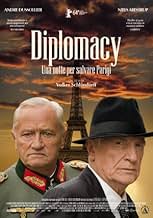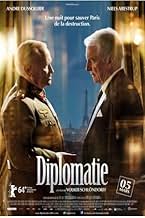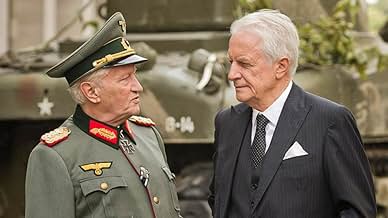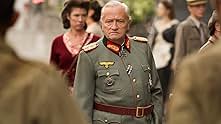Ein Geschichtsdrama, das die Beziehung zwischen Dietrich von Choltitz, dem deutschen Militärgouverneur im besetzten Paris, und dem schwedischen Generalkonsul Raoul Nordling schildert.Ein Geschichtsdrama, das die Beziehung zwischen Dietrich von Choltitz, dem deutschen Militärgouverneur im besetzten Paris, und dem schwedischen Generalkonsul Raoul Nordling schildert.Ein Geschichtsdrama, das die Beziehung zwischen Dietrich von Choltitz, dem deutschen Militärgouverneur im besetzten Paris, und dem schwedischen Generalkonsul Raoul Nordling schildert.
- Auszeichnungen
- 5 Gewinne & 6 Nominierungen insgesamt
- Opérateur radio
- (as Pierre-Marie Rochefort)
Handlung
WUSSTEST DU SCHON:
- Zitate
Général von Choltitz: Do you know what we do to men like you?
Raoul Nordling: Give them a medal?
Général von Choltitz: [breaking a smile] Yes, on occasion.
[stern again]
Général von Choltitz: Posthumously.
- VerbindungenFeatured in Diplomatie: Making of (2015)
- SoundtracksLa 7ème symphonie
Music by Ludwig van Beethoven (as Beethoven)
Conducted by Wilhelm Furtwängler
Berlin 1943 © Société Wilhelm Furtwängler
Performed by Berliner Philharmoniker (uncredited)
The play-turned-movie is the story of the general in charge of the Nazi Occupation of Paris, and the Swedish diplomat who has a passing relationship with the man when the play begins. All of Paris' great architectural treasures are to be destroyed to buy time for the retreat of the Nazi army across France, and it's only a matter of hours before the order is given. The Swedish diplomat in his powerful and sly persuasive style takes on the general in trying to dissuade him through some of the most artful, intelligent and brilliant rhetoric I've seen in a movie. In many ways the film feels like a boxing match, a final scene in a Rocky movie between an underdog boxer and his strong but weary opponent who seemingly has no weaknesses.
There is both the German and French culture's strengths and weaknesses on display (even though the diplomat represents Sweden he openly says that Paris has embraced her and she him). I love this sort of contrast, particularly in showing that Germans have a softer side that's deep and valuable to them, and the French have a gristly fighting spirit that was formidable and feared up to this day; unfortunate stereotypes for both cultures. I read a quora article today about how the French didn't flee the Germans, they fought but in the WWI style that was ineffective against the Blitzkrieg (now adopted by all modern militaries in the world today). We also forget the British lost to the Germans shortly afterward, and were driven back to their island.
The movie feels like a play, which I would somewhat fault it for in some ways, but it doesn't become a distraction or take away from the film. Also the movie seems small at times, with 90% of the dialog happening in one room in a hotel where the Nazi general works. Granted, this is likely due to the low budget and it does help the motif of the movie being about the power these two men have over the fate of Paris.
This movie falls in line with a string of films lately that could almost make a genre itself: the artist/culturally sensitive figure fighting to preserve and save artistic treasures amidst a raging battle. "Monuments Men" and "The Train" come to mind immediately.
I can't help but think of all the destruction caused by wars, the Abbey at Monte Cassino being one, as well as several that we're seeing in the Middle East. I remember reading about how many important buildings and museums were threatened and attempted to be preserved as the US army went through Iraq.
Historical treasures that are destroyed by war is one of the greatest arguments against it, its chaos and disregard for what's most valuable in the world. A broader theme though is the value of an entire culture and its history, and how often war and strife easily take those down, possibly because they're so prominent and essential to a city's character. Coming from a country like the US, I don't have as acute a sense of this as those who live in Europe, but there is still something in humanity in which we are drawn to monumental art, and value it as more than just a tourist site. Paris is an easy example of this.
The movie is worth seeing, and it's quaint in its setting, and beams a sense of humility which is refreshing when movies in our time seem to fight to be the biggest (though the consequences of the decisions made in the movie are massive). It's where live theater has something to offer the world of movies, a kind of depth through being as small as possible.
- wpedmonson
- 8. Dez. 2014
- Permalink
Top-Auswahl
Details
- Erscheinungsdatum
- Herkunftsländer
- Offizieller Standort
- Sprachen
- Auch bekannt als
- Diplomacy
- Drehorte
- Jardin des Tuileries, Paris 1, Paris, Frankreich(city park in front of the hotel)
- Produktionsfirmen
- Weitere beteiligte Unternehmen bei IMDbPro anzeigen
Box Office
- Bruttoertrag in den USA und Kanada
- 230.880 $
- Eröffnungswochenende in den USA und in Kanada
- 8.518 $
- 19. Okt. 2014
- Weltweiter Bruttoertrag
- 4.207.242 $
- Laufzeit1 Stunde 24 Minuten
- Farbe
- Sound-Mix
- Seitenverhältnis
- 2.35 : 1
Zu dieser Seite beitragen




























